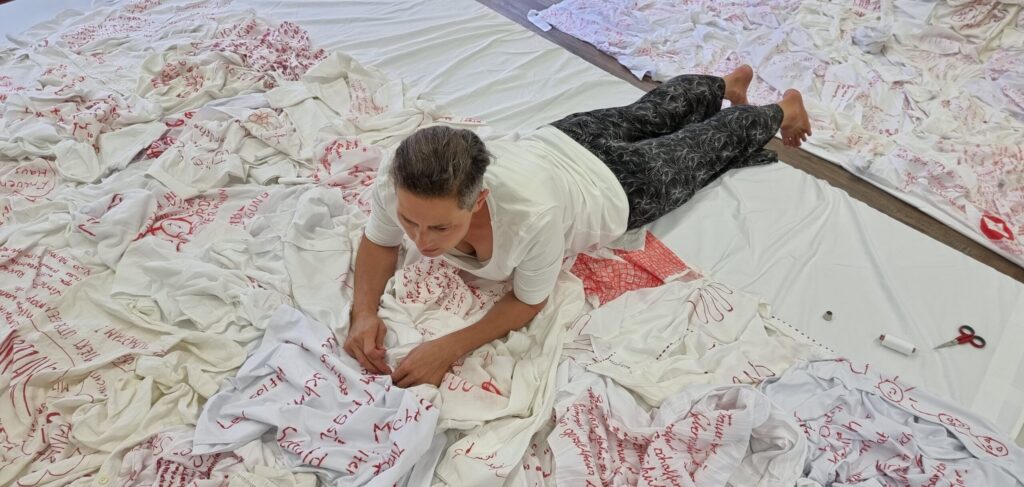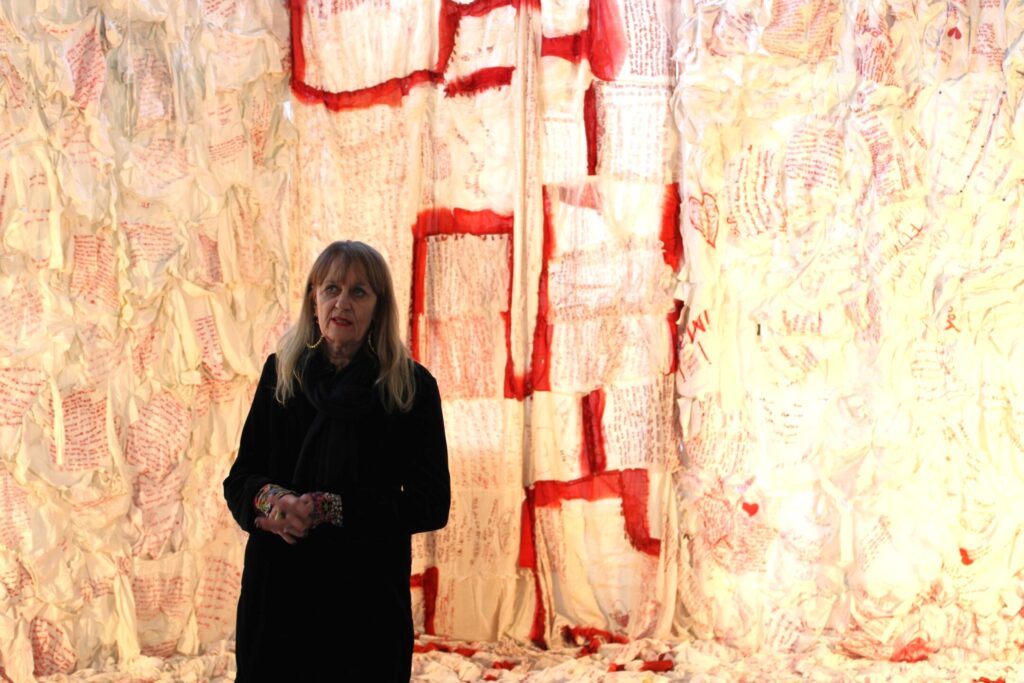To mark the 16 days of activism against gender-based violence, UNIDIR is partnering with Swiss Artist and Psychotherapist Franziska Greber to raise awareness about violence against women and girls, including sexual violence in conflict. Franziska shares reflections about her inspiration, hopes and expectations for the artistic project DISARMING SILENCE, which is on display from 25 November to 10 December at the Palais des Nations in Geneva, Switzerland.
Q: You are an artist and a psychotherapist, working with survivors of domestic violence. How do you see the connection between these areas?
A: Art serves as a platform that amplifies my commitment to confronting discrimination and violence, while opening up transdisciplinary dialogues that reach beyond the clinical and into the societal and political sphere. The inclusion of those directly affected constitutes the core of my conceptual framework.
For me, art is a way to give voice to the marginalized, ignored or silenced. To give voice entails radical openness and an acceptance of the uncertainty inherent in what may come into being; it forms the very basis of listening.
My artistic practice addresses gender-based violence by creating forums for testimony and collective reflection, revealing the patterns of silence and power. Through participatory methods, contexts emerge in which listening becomes an act of recognition and resistance.

Q: Could you describe your creative process and how it led you to develop the art installation DISARMING SILENCE being displayed at the Palais des Nations?
A: The artwork comprises hundreds of garments — white shirts and dupattas — created in the countries where I have realized my international art project WOMEN IN THE DARK: Chile, China, Germany, India, Mauritius, the Seychelles, Switzerland, and Zimbabwe.
The selection of countries emerged from my travels and professional networks, reflecting an intention to engage with diverse continents and cultural perspectives.
Each piece of clothing bears personal testimonies of discrimination and violence, alongside expressions of hope and demands for change. Accompanying books present the original writings with English translations, while video installations render the participants visible and audible as they read or inscribe their words.
Q: How does the problem of violence against women appear in this artwork?
A: Violence against women manifests itself in this work through acts of testimony. The garments, inscribed with permanent red markers, carry the women’s own words.
This project does not speak about women — they raise their voices themselves.
Rather than representing violence, the work, in its multilayered and multimedia form, reveals individual experiences and transforms them into a collective, transnational presence. In doing so, it shifts the focus from the role of the victim to the agency of survivors, from invisibility to voice.
Q: What motivated you to collaborate with UNIDIR?
A: Firstly, the collaboration with UNIDIR is an opportunity to position artistic practice within the multilateral space where States come together to address security concerns, human rights and development issues that affect us all.
Secondly, UNIDIR’s research on the prevention of conflict-related sexual violence provides a strong base for interdisciplinary approaches that can support women’s empowerment, which is a key aspect of my own artistic work. The dialogue between UNIDIR’s research findings and the participatory, experience-based processes of artistic practice engenders new epistemic and affective forms of understanding.
Q: What impact do you hope this immersive installation will have on viewers?
A: In close collaboration with UNIDIR, the installations translate research insights into a sensory and affective experience that transcends political and cultural boundaries. Through its participatory and transnational structure, the project invites engagement with the realities of sexual and gender-based violence — not through representation, but through the immediacy of women’s own voices.
These voices move, unsettle and challenge — they ask, and they ask for a future beyond violence.
The exhibition seeks to deepen the understanding of survivors’ experiences and to foster the recognition that the prevention of violence requires not only political and legal measures, but also cultural transformation — a redefinition of how societies perceive and actively transform the lived realities of women for the better.
UNIDIR is grateful for the support received from Canada, Germany, Ireland, Malta, Mexico, the Netherlands, Norway, Rotary Club Zürich-Bellevue, UN Action, and UN Women.

